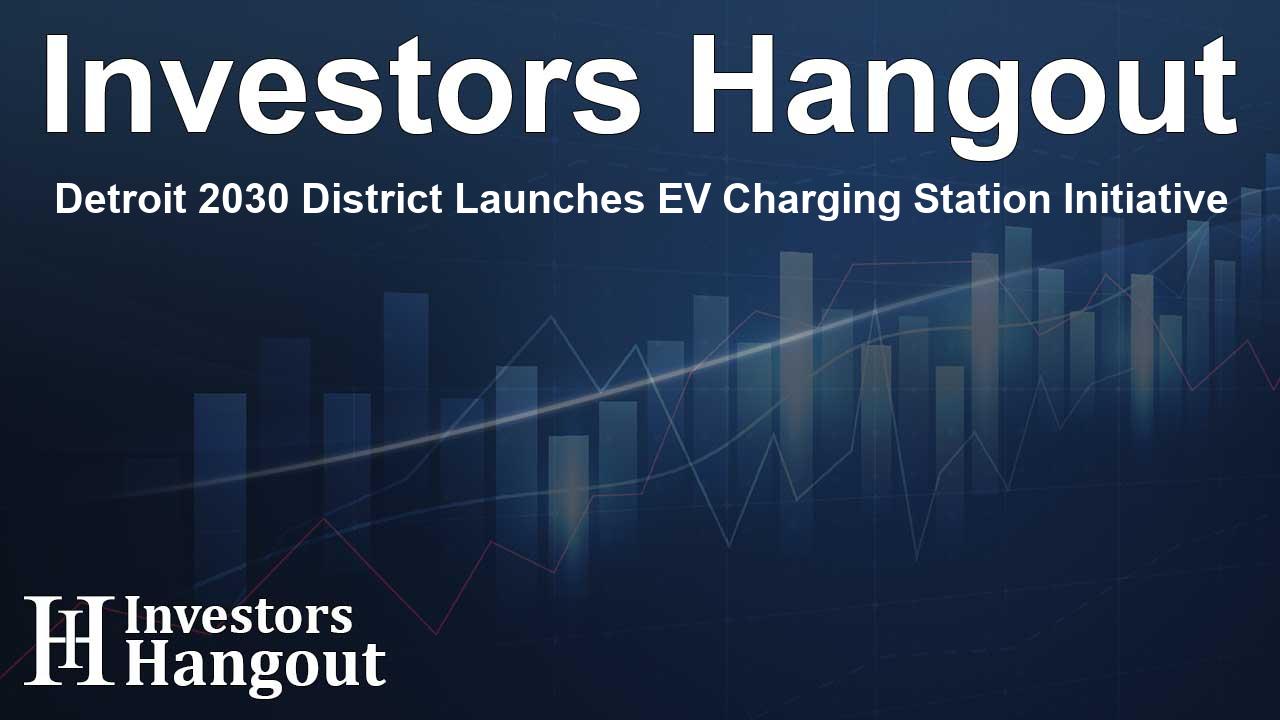Detroit 2030 District Launches EV Charging Station Initiative

Detroit 2030 District Introduces EV Charging Stations
The Detroit 2030 District is making strides in sustainable urban development with the announcement of its new EV Charging Station program. This initiative is focused on installing ten electric vehicle (EV) charging stations at select member buildings, particularly prioritizing houses of worship in underserved neighborhoods. Through this program, the District aims to substantially mitigate carbon emissions associated with transportation while enhancing the accessibility of EV charging solutions throughout the community.
Supporting Local Communities with Clean Energy
According to Peggy Matta, the EV Charging Program Manager for the District, the initiative aims to provide Detroit 2030 District building owners with essential resources to encourage the use of electric vehicles. This is particularly important for six houses of worship that are located in neighborhoods where mobility and access to transportation pose significant challenges. This program is a significant step forward, ensuring that residents have the opportunity to charge their electric vehicles conveniently.
Collaborations with Local Organizations
The Detroit 2030 District has partnered with various local organizations and nonprofits to enhance the impact of its program. This collaboration includes efforts from community-oriented groups dedicated to sustainable practices and improved accessibility to EV charging infrastructure. The goal is to create a reliable network that supports the increasing demand for electric vehicles.
Community Perspectives on the Program
Sonya Bennett from Beth Eden Missionary Baptist Church expressed excitement about receiving a Level 2 EV charging station at no cost for the congregation. This installation reflects the broader goal of making green initiatives accessible to the community. By providing affordable charging options, the program fosters an inclusive approach that benefits everyone.
Environmental Goals and Benchmarks
The initiative is part of the Detroit 2030 District's comprehensive strategy to reduce carbon emissions from buildings. To date, over 500 buildings covering more than 67 million square feet are enrolled in this program. With rigorous benchmarking, building owners can assess and optimize their energy and water usage efficiently, thus complying with local sustainability ordinances.
Ensuring Equitable Access to EV Charging
As electric vehicle adoption becomes increasingly mainstream, the importance of equitable access to charging stations cannot be overstated. The programs involving Michigan Clean Cities and NextEnergy emphasize community engagement and support to alleviate concerns regarding availability and accessibility of charging options. This initiative aims to bring forth a network of charging stations that bridge gaps in service and accessibility throughout the city.
The Road Ahead for Electric Vehicles in Detroit
The Detroit 2030 District continues to advocate for environmental justice while promoting responsible building practices. The free education and resources provided to members amplify the potential for reducing operational costs and enhancing sustainability. Such initiatives not only support local communities but also promote broader economic development across the region.
Understanding the Future of EV Infrastructure
With projected growth for electric vehicles, the installation of charging stations is merely the beginning. The Detroit 2030 District envisions a future where sustainable energy use is the norm. This includes ongoing collaborations and innovations that will further solidify the commitment to a greener urban landscape.
Frequently Asked Questions
What is the aim of the Detroit 2030 District's EV Charging Station initiative?
The initiative aims to provide convenient EV charging options, especially in underserved neighborhoods, to reduce transportation-related carbon emissions.
Who benefits from the EV Charging Stations?
Member buildings, including houses of worship, receive charging stations at no cost, benefiting communities that may face transportation challenges.
Which organizations are involved in this initiative?
The initiative involves partnerships with local organizations like Michigan Clean Cities, NextEnergy, and DTE Energy to create a sustainable EV charging network.
What resources does the Detroit 2030 District offer to its members?
Members receive education, resources, and assistance in managing their energy and water usage, enhancing their sustainability practices.
How does the program aim to reduce carbon emissions?
By promoting the use of electric vehicles and providing essential charging infrastructure, the initiative plays a crucial role in lowering overall carbon emissions in the built environment.
About Investors Hangout
Investors Hangout is a leading online stock forum for financial discussion and learning, offering a wide range of free tools and resources. It draws in traders of all levels, who exchange market knowledge, investigate trading tactics, and keep an eye on industry developments in real time. Featuring financial articles, stock message boards, quotes, charts, company profiles, and live news updates. Through cooperative learning and a wealth of informational resources, it helps users from novices creating their first portfolios to experts honing their techniques. Join Investors Hangout today: https://investorshangout.com/
Disclaimer: The content of this article is solely for general informational purposes only; it does not represent legal, financial, or investment advice. Investors Hangout does not offer financial advice; the author is not a licensed financial advisor. Consult a qualified advisor before making any financial or investment decisions based on this article. The author's interpretation of publicly available data shapes the opinions presented here; as a result, they should not be taken as advice to purchase, sell, or hold any securities mentioned or any other investments. The author does not guarantee the accuracy, completeness, or timeliness of any material, providing it "as is." Information and market conditions may change; past performance is not indicative of future outcomes. If any of the material offered here is inaccurate, please contact us for corrections.